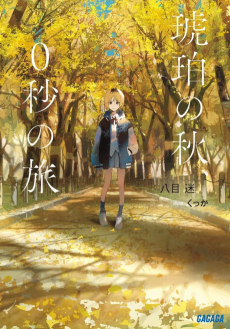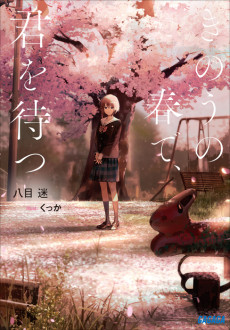MIMOZA NO KOKUHAKU
STATUS
COMPLETE
VOLUMES
5
RELEASE
June 18, 2024
CHAPTERS
15
DESCRIPTION
Growing up in a dreary suburb, Sakuma has little to brighten his humdrum days aside from his best friend. The bright, talented, and attractive Ushio seems to have everything Sakuma lacks, and his academics and athletic prowess make him popular with the girls at school. Past trauma—and an understandable inferiority complex—slowly drive the two apart, and by the time they enter high school, they hardly even speak anymore. Thus, Sakuma finds himself alone.
Against all odds, he eventually gains a friend in Natsuki, the sweetest girl in class. The two hit it off gushing about their favorite novels, and he falls head over heels for her. But that very same night, he stumbles upon an unexpected sight while walking through a familiar park: his old friend Ushio, dressed in a full-blown schoolgirl’s uniform and sobbing uncontrollably.
(Source: Seven Seas Entertainment)
Note: Includes 5 extra chapters.
CAST

Ushio Tsukinoki

Sakuma Kamiki

Natsuki Hoshihara

Arisa Nishizono

Rin Mashima

Touka Shiina

Itsuki Sera
CHAPTERS
REVIEWS

minmod
95/100"Mimosa Confessions, Volume 1" is an engaging read, balancing school-life romance with serious social themesContinue on AniListThis review contains light spoilers.
"The Mimosa Confessions, Volume 1" by Mei Hachimoku expertly combines classic school-life romantic comedy with dramatic social commentary, elevating both aspects with a humanizing touch and an earnest perspective. Set in the near past in a distant town cut off from the rest of the world, the most popular boy in school quietly, yet resolutely, announces that she’ll be living as a girl from then on. Her childhood best friend, since estranged, now feels the compulsion to rebuild his friendship with her - and perhaps build something new together, as well.

The story flows so seamlessly that once you start reading, it’s quite hard to stop, due to the steady flow of dramatic confrontations, lively student life events, and romantic cliffhangers. Our main protagonist, Sakuma Kakimi, is a thoughtful, introspective, yet anxious loner frustrated with living in a backwater town. He wants to be supportive to his new old friend, but is too unprepared and conflicted to lead himself forward. Our main heroine, Ushio Tsukinoki, is a would-be classic “cool beauty” - quiet, athletic, calm, has no interest in drama or causing a scene, but has clearly smoldering emotions beneath the surface of her admittedly carefully-constructed mask, much like her once-secret gender issues. (The “confessions” in the title is pluralized for a reason, after all.)
Meant for casual readers, the novel does its best to avoid overly ordained language concerning the subject matter, and instead displays all manner of human reactions towards the controversy as would naturally happen in a small rural town; casual gossip, helpless ignorance, light support, vicious bullying. One should commend the author for committing to the display of the full gamut of reactions - from Ushio’s subtle understated explanation of her own feelings, to 'Queen Bee' Arisa Nishizono’s extremely accurately-portrayed increasingly aggressive bullying. While some readers may need forewarning of such material, nobody who’s a stranger to modern day online discussions should blush overmuch. "What would realistically happen...?" is a question that must be asked and answered when writing earnestly, which pairs well with our protagonist who is constantly second-guessing himself and his own morals in a realistic manner.

Despite some heavy subject matter, most of the story is quite fun, light, and lively as Hachimoku balances each element of the classic Light Novel fairly well, and you'll probably laugh a few times too (Who eats french fries with chopsticks!?). The second half has a lighter mood as well, with wild playboy character Sera making a appearance in-between some literally feverish studying sessions in order to win the heart of a girl (Which girl, though?). The lighter romantic comedy school-life element humanizes the serious social issue element, and the latter enriches the former in turn. One might compare this to a more pastoral Oregairu with a touch of To Kill A Mockingbird, while remaining shockingly contemporary.
The author avoids making the characters too one-dimensional or perfect, and raises clear character conflict and exploration flags for later volumes. Sakuma deals with old burning feelings of jealousy for Ushio's former popularity, and even the antagonistic characters such as the aggressive Nishizono operates on their own underlying logic rather than being complete strawmen. There’s both an earnest humanity and frank reality to The Mimosa Confessions missing from many other stories like it, while still being an easy brisk read.

The story also explicitly avoids certain trappings often found in related media, such as not orbiting the entire conflict around gendered clothing/hobby stereotypes, or revealing some ulterior motive to Ushio's decision, showing a level of genre-awareness by the author. In an interview with LN-News, the author explained how his original drafts involved a magical/science-fiction gender transformation, to distance himself from the intimidating cultural controversy he was witnessing in the news and media at the time. His editor, however, questioned if such elements were actually necessary to tell the story he wanted to tell, and what remained afterwards was a clean and unmistakable narrative. The author took his own initial hesitation as an act of “discrimination” itself - the willingness to avoid uncomfortable topics, which can be seen expressed in the work itself. It is not squeaky-clean or focus-group tested, or overly didactic and moralistic, but an honest airing of human conflicted feelings while remaining highly empathetic, which makes it all the more interesting in today's cultural landscape.
Ushio’s very real physical issues are not brushed past or ignored, but rather the core to the central conflict itself, while also not being her only personality trait - a very delicate balance that few authors can ever reach, but Hachimoku surely accomplishes it thus far. Ushio humbly talks about herself and her issues in purely natural ‘human’ terms, suggesting a deep understanding of the issue by the author, who even includes a list of references containing several related autobiographies informing his writing, without ever coming off as cliché or too "textbook" and clean. The portrayal of Ushio goes deeper than tokenism, novelty, or second-hand guesswork, and towards a true sense of sympathy for both her pain and desires - it's the author's hope, he says, that Ushio becomes a widely beloved heroine amongst readers. Characters such as these tend to be either critically underexplored or relegated to the sidelines as support roles to the main couple, and are usually never allowed to seriously consider having any desires beyond the initial act of 'coming out' or transitioning itself. Hopefully, Ushio gets to experience true romance as well, as a heroine as any other.

Knowing of the original version to some degree, the translation seems to be suitable and accurate, with the character's individual personalities coming through with casual youthful dialogue in an era before smartphones became ubiquitous. One technical liberty is taken in the English version concerning Ushio hesitating to speak in a more feminine speaking pitch contrasting her deeper voice, to replace the Japanese embarrassed avoidance of referring to herself using feminine-leaning ‘watashi’ pronouns (literally 'speaking more feminine'). This was fairly clever and probably unavoidable without having to indulge in other major reworkings to compensate.
I truly can’t wait to read more to discover and explore more about this colorful fun cast of characters, as it feels the story is only just beginning to unfold. The next volume is set to release by October, and I hope eventually all five completed volumes will be in my bookshelf someday soon. This is an extremely novel concept to approach not just in Light Novels, but in any currently published literature. It would be exciting to see it adapted to television anime as well, considering it seems fairly popular and well-received in Japan. Future volumes will apparently also switch between different character point-of-views, which will be exciting to explore as well.
The author has stated how he’d like everyone to read and enjoy Mimosa Confessions even if they are not interested in gender or any other heavy topics, and I agree. Hopefully, more people will give this a good honest try.

Fearlock
95/100This is a story about a boy that decides to live as a girl and the struggle and prejudice that follows it.Continue on AniListThe Mimosa Confessions is a light novel that first piqued my curiosity not only because of its premise but the fact that it ended up being a relatively short series (the last and fifth volume will be published the month I write this review).
A story about a transgender heroine is a peculiar and uncommon one, and its a delicate matter to broach, but rest assured that the author, Hachimoku Mei, handled the matter with the utmost care and respect. He also did a pretty good job of making it painful, bitter, sometimes lighthearted and funny, but always compelling to read. That's the most important thing to me.
I can sum up the first volume as the protagonist, Sakuma, struggling with the fact that his old best friend, Ushio, is now a girl. All hell breaks loose from this point onward, as Ushio suffers with the decision of adopting a lifestyle that best suits her. Its also a book containing a love triangle, as Sakuma falls in love with Hoshihara, a peppy girl from the same class as him and Ushio, but who also happens to have a crush on the person Ushio used to be. Suffice to say this tangled relationship is done well and I'm quite curious with how things will fare in the future.
I have to make one thing very clear: Hachimoku Mei's writing is pretty damn good. Its my first time reading his work, and it left so good of a impression on me that I will definitely read his other books. His writing really struck its chord with me on a personal level. Not only because of how he handled stuff in general, but stories with rural settings always enthrall me, but its useless if the author's writing is poor. Fortunately, that isn't the case here.
The Mimosa Confessions takes place in a "backwater country town" (this is exactly how it is described in the book) and this setting is portrayed majestically thanks to the author's writing, it's as if it teleports you to this place you've never been or seen, as you follow the characters day-to-day and struggles. I always see writing as some form of magic, certain people have this ability to create a world, characters and drama so human and real you care for this so much that you feel a whirlpool of emotions while you read the book. That's a sign of a good author, and most importantly, of a good story.
In regard to the characters, I loved how the author tried to rationalize their thoughts and way of seeing life, as a contentious book handling certain topics, obviously you will have lots of prejudice present there, and characters with strong opinions, but I think the author did a good job of giving some kind of logic to their actions and thinking, even if you as a reader will see it as wrong and hate them. The author stated in the afterword that he hoped this book would provide some food for thought, and after reading it, I can see why.
To sum things up, even if you don't find the premise appealing at all, I would say to give it a try if you like drama with well-characterized characters and a good prose. Don't dwell too much on the transgender bit, of course it is the main theme of the story, its interesting and well-handled, but the most important thing is that its just a damn engaging read.
SIMILAR MANGAS YOU MAY LIKE
 NOVEL AdventureKohaku no Aki, 0 Byou no Tabi
NOVEL AdventureKohaku no Aki, 0 Byou no Tabi
SCORE
- (3.65/5)
TRAILER
MORE INFO
Ended inJune 18, 2024
Favorited by 42 Users


